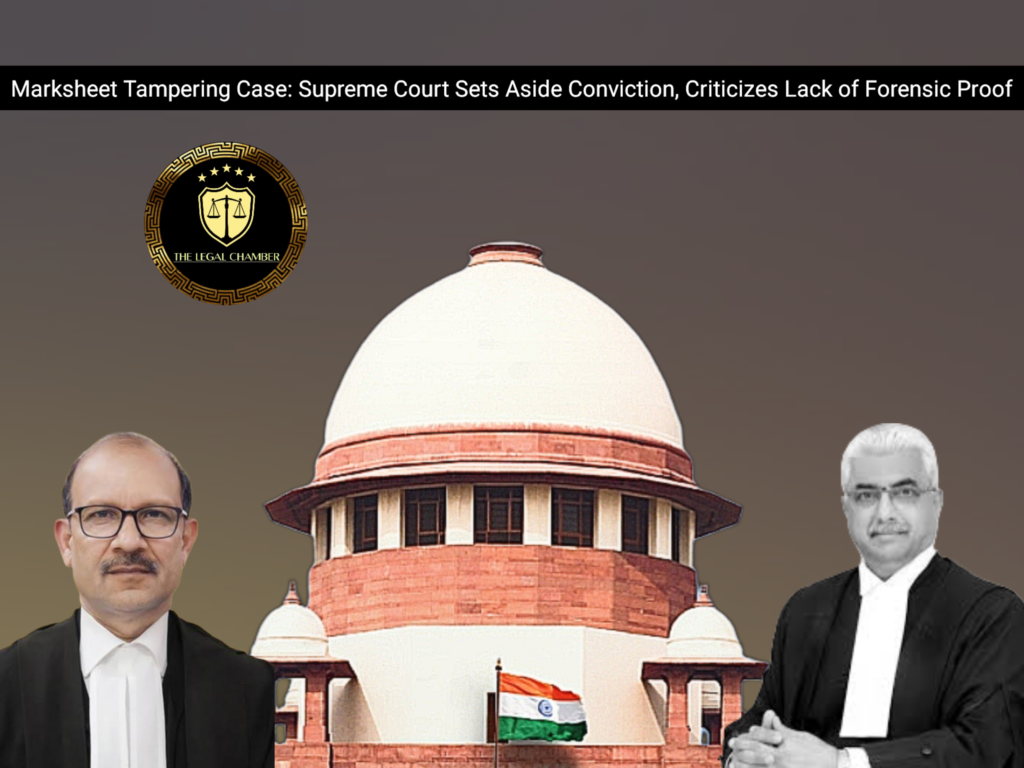
The Supreme Court overturned the conviction, holding that the prosecution failed to prove the appellant’s authorship of the alleged forgery beyond a reasonable doubt. The absence of expert evidence on handwriting, lack of proof of exclusive custody of the documents, and the failure to establish mens rea were fatal to the case. The court also noted prejudicial non-compliance with Section 313 CrPC.
Facts Of The Case:
The appellant, a student pursuing a Bachelor of Social Work, had failed her compulsory English paper in the 1998 summer session examinations, securing only 10 marks upon revaluation. To gain admission to the third-year course (BSW Part-III), she submitted her original mark-sheet and the revaluation notification to her college. The admission clerk and the principal verified these documents before they were forwarded to the university. The prosecution alleged that the marks in the compulsory English subject had been tampered with—from “10” to “18” on the mark-sheet and from “10” to “30” on the revaluation notification—and that the appellant used these forged documents to secure admission. Based on a complaint from the university, an FIR was registered. After a trial, the appellant was convicted under Sections 420, 468, and 471 of the Indian Penal Code. Her conviction was upheld by the appellate court and later in a revision petition, which however acquitted the other two accused, the college principal and the admission clerk. The appellant then appealed to the Supreme Court, challenging the conviction primarily on the grounds of insufficient evidence connecting her to the alleged forgery.
Procedural History:
The procedural history of the case began with the appellant’s conviction by the Trial Court for offences under Sections 420, 468, and 471 of the Indian Penal Code. Following this conviction, the appellant filed a Criminal Appeal, which resulted in a modification of the sentence but an affirmation of the conviction. Subsequently, the appellant, along with the other accused, filed a Criminal Revision Application before the High Court. The High Court, through its impugned order, acquitted the co-accused (the college principal and admission clerk) but upheld the conviction and modified sentence of the appellant (Accused No. 1). Aggrieved by the High Court’s decision, the appellant filed a Special Leave Petition before the Supreme Court of India, which granted leave and, upon hearing the appeal, set aside the appellant’s conviction and sentence.
READ ALSO:Supreme Court Rules: Police Must Register FIR on Cognizable Offence, Can’t Wait for Victim to Complain
Court Observation:
The Supreme Court made several critical observations while setting aside the conviction. It held that the prosecution failed to prove the appellant’s authorship of the alleged tampering, especially since the documents passed through multiple institutional hands, breaking the chain of exclusive custody. The Court emphasized that the conviction, based merely on visual inference of overwriting without corroboration from a handwriting or forensic expert, was unsafe and did not meet the standard of proof beyond reasonable doubt. Furthermore, the Court found that the essential element of mens rea (dishonest intention or knowledge) for the offences was not established, as the documents had been stamped and verified by college authorities. Lastly, the Court noted a prejudicial violation of Section 313 of the CrPC, as incriminating circumstances were put to the appellant in compound questions, denying her a fair opportunity to explain.
Final Decision & Judgement:
The Supreme Court allowed the appeal and set aside the conviction of the appellant. The Court held that the prosecution had failed to prove its case beyond a reasonable doubt, specifically highlighting the failure to establish the appellant’s authorship of the alleged forgery, the lack of proof regarding her exclusive custody of the documents, and the absence of evidence to demonstrate the necessary mens rea. Consequently, the impugned judgment of the High Court was overturned, and the appellant was acquitted of all charges under Sections 420, 468, and 471 of the Indian Penal Code.
Case Details:
Case Title: Vandana vs. State of Maharashtra Citation: 2025 INSC 1098 Criminal Appeal No.: Criminal Appeal No. 3977 of 2025 Date of Judgement: September 11, 2025 Judges/Justice Name: Justice Aravind Kumar and Justice Sandeep Mehta
Download The Judgement Here